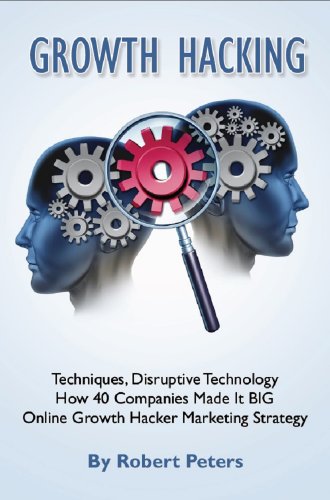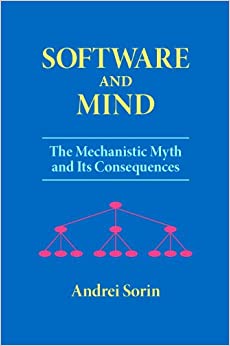| Book Name: | [PDF] Software and Mind |
| Category: | Computer Books ( CE & IT ) |
| Free Download: | Available |
Software and Mind By Andrei Sorin
About the Book
Software and Mind: The Mechanistic Myth and Its Consequences is programming ideology book by Andrei Sorin, published in 2013.
Addressing general readers as well as software practitioners, Software and Mind discusses the fallacies of the mechanistic ideology and the degradation of minds caused by these fallacies. Mechanism holds that every aspect of the world can be represented as a simple hierarchical structure of entities. But, while useful in fields like mathematics and manufacturing, this idea is generally worthless, because most aspects of the world are too complex to be reduced to simple structures. Our software-related affairs, in particular, cannot be represented in this fashion. And yet, all programming theories and development systems, and all software applications, attempt to reduce real-world problems to neat hierarchical structures of data, operations, and features.
Using Karl Popper’s famous principles of demarcation between science and pseudoscience, the book shows that the mechanistic ideology has turned most of our software-related activities into pseudoscientific pursuits. Using mechanism as warrant, the software elites are promoting invalid, even fraudulent, software notions. They force us to depend on generic, inferior systems, instead of allowing us to develop software skills and to create our own systems. Software mechanism emulates the methods of manufacturing, and thereby restricts us to high levels of abstraction and simple, isolated structures. The benefits of software, however, can be attained only if we start with low-level elements and learn to create complex, interacting structures.
Software, the book argues, is a non-mechanistic phenomenon. So it is akin to language, not to manufactured objects. Like language, it permits us to mirror the world in our minds and to communicate with it. Moreover, we increasingly depend on software in everything we do, in the same way that we depend on language. Thus, being restricted to mechanistic software is like thinking and communicating while being restricted to some ready-made sentences supplied by an elite. Ultimately, by impoverishing software, our elites are achieving what the totalitarian elite described by George Orwell in Nineteen Eighty-Four achieves by impoverishing language: they are degrading our minds.
Some of the consequences of the mechanistic software myth
• The software elites have turned software into a weapon, a means to dominate and control society.
• We depend more and more on the type of software that demands only trivial skills, so we are prevented from using our minds and expanding our knowledge.
• The software elites are inducing dependence on inferior, standard systems, and are preventing independent, responsible programming.
• New software products are installed every year in millions of places without being used, presumably because they are not the “solutions” they were said to be.
• Software products and innovations are advertised by describing a few successes, which is logically equivalent to lying.
• Universities are teaching and promoting invalid, pseudoscientific software notions.
• Less than 1 percent of the programming activities in society represent useful work – work benefiting society in the way the work of doctors does.
• Individuals with practically no programming experience act as industry experts – they write books on programming, teach courses, and provide consulting services.
• Many software companies exploit the ignorance of programmers and users by suggesting that their products possess supernatural powers.
• Programmers rely on worthless theories, development environments, and ready-made pieces of software, instead of programming and improving their skills.
• Major government projects are abandoned after spending vast amounts of public money, while the incompetents responsible for these failures continue to be seen as software experts.
• Corporations cannot keep their software applications up to date and must acquire or develop new ones over and over.
• Society must support a growing software bureaucracy – more and more workers are changing from individuals who perform useful tasks to individuals who merely practise the mechanistic software myth.
• The concept of expertise is being degraded to mean, not the utmost that human minds can attain, but simply acquaintance with the latest software systems.
• Our software culture is so corrupt that it has become, in effect, a form of totalitarianism.
About the myth
The mechanistic myth is the belief that everything can be described as a neat hierarchical structure of things within things. And few of us realize that our entire culture is now based on this fallacy. While the world consists of complex, interacting structures, we prefer to treat every phenomenon as a simple, isolated structure.
Through our software pursuits, the mechanistic myth has spread beyond its academic origins and is affecting every aspect of human existence. In just one generation, it has expanded from worthless theories of mind and society (behaviourism, structuralism, universal grammar, etc.) to worthless concepts in the field of programming (structured programming, object-oriented programming, the relational database model, etc.) to worthless software-related activities that we all have to perform.
What is worse, our mechanistic beliefs have permitted powerful software elites to arise. While appearing to help us enjoy the benefits of software, the elites are in fact preventing us from creating and using software effectively. By invoking mechanistic software principles, they are fostering ignorance in software-related matters and inducing dependence on their systems. Increasingly, in one occupation after another, all we need to know is how to operate some software systems that are based on mechanistic principles. But our minds are capable of non-mechanistic knowledge. So, when the elites force us to depend on their software, they exploit us in two ways: by preventing us from creating better, non-mechanistic software; and by preventing us from using the superior, non-mechanistic capabilities of our minds.
The ultimate consequence of our mechanistic culture, then, is the degradation of minds. If we restrict ourselves to mechanistic performance, our non-mechanistic capabilities remain undeveloped. The world is becoming more and more complex, yet we see only its simple, mechanistic aspects. So we cope perhaps with the mechanistic problems, but the complex, non-mechanistic ones remain unsolved, and may eventually destroy us.
Reviews:
The scientific method of mechanism, by which the study of all things is broken down to their smallest building blocks and reassembled in hierarchical order, is the intellectual crowbar that tore down the religion-based myths that dominated thought before the Renaissance. Veteran programmer and computer scientist Andrei Sorin argues that mechanism has outlived its usefulness. Worse, it has become the new mythology, one as vigorously defended by today’s academic and technological elite as the papacy and the Inquisition protected the belief system of the Middle Ages.
As the jacket attests, Sorin has the credentials that demand respect when he talks about his field of expertise and the world in which he works. While his weighty, 944-page tome, Software and Mind, is at first look overwhelming and intimidating, the arguments and observations put forth in the massive work are surprisingly, and thankfully, understandable and approachable. There is a great deal of repetition, which the author freely admits is intentional, but that repetition is necessary if a reader without his background is to comprehend his thesis.
That thesis is a damning one. It accuses academic and “software elites” (many of whom he names) of imposing an Orwellian totalitarianism on not only the scientific computer software community, but also upon those who use its products. Sorin, like the great thinkers of the Renaissance and the Age of Enlightenment, seeks to break free of these artificial restraints, which he believes “attempt to reduce real-world problems to neat hierarchical structures of data, operations and features.”
Software and Mind is not a light or easy read, although Sorin works diligently to present his theories in a logical progression and in a language and style that does not require a reader to have an advanced degree to follow, understand, or digest. Engineers are often derided for their inability to communicate ideas in ways the layman can grasp. If that is a rule, Sorin is the exception.
Each of eight chapters is broken into sections, subsections, and what he calls “numbered parts.” Seven are self-contained journeys of exploration into such topics as “Language and Software,” “Pseudoscience,” and “From Mechanism to Totalitarianism.” One, however, is a book unto itself.
At more than 320 pages, Chapter Seven represents not only a physical third of the book, but also its theoretical core. Each of its three main sections are further subdivided into nine or ten subsections, and it is here that Sorin takes on what he sees as the true nemesis of freedom-loving software scientists everywhere: structured programming, object-oriented programming, and the relational database model. He derides these theories, once hailed as revolutionary, as not only “pseudoscience” but also as the equivalent of “totalitarianism.”
Sorin’s indictment of his profession is sure to stir up controversy and may come as a big surprise to many of his colleagues, let alone to the general public, which has come to revere software creators as something akin to the gods of old. Then again, false gods have fallen before, and Sorin, if he is indeed correct, may just be the scientist who cracks the mythological foundation upon which he claims the modern deities of the computer age stand.
[PDF] Software and Mind Table Of Contents
Belief and Software (84 pages, 597 KB)
This chapter is an introduction to the mechanistic myth and the mechanistic software myth, and an analysis of the similarity of mechanistic software beliefs to primitive beliefs.
Mechanism and Mechanistic Delusions (92 pages, 702 KB)
This chapter explains the mechanistic philosophy and its limitations, the mechanistic fallacies, and the difference between mechanistic and non-mechanistic phenomena.
The Mind (78 pages, 549 KB)
This chapter shows why the mechanistic models promoted by the software elites cannot attain the intelligence, creativity, skills, and intuition of human beings.
Pseudoscience (114 pages, 815 KB)
This chapter discusses the concept of pseudoscience, the principles of demarcation between science and pseudoscience developed by Karl Popper, and the value of these principles in studying the pseudoscientific nature of our mechanistic culture.
Language and Software (88 pages, 711 KB)
This chapter shows that language and software are non-mechanistic phenomena, are based on similar principles, and fulfil a similar role in society.
Language as Weapon (58 pages, 423 KB)
This chapter explains how language is used to deceive and to manipulate people by restricting them to mechanistic thinking.
Software as Weapon (102 pages, 707 KB)
This chapter explains how the mechanistic fallacies lead to software delusions, and how the software elites use these delusions to exploit society.
Software Engineering (344 pages, 2,734 KB)
This chapter analyzes the mechanistic fallacies inherent in the idea of software engineering, and exposes the pseudoscientific nature of the mechanistic programming theories.
From Mechanism to Totalitarianism (76 pages, 545 KB)
This chapter examines the totalitarian tendencies of the mechanistic philosophy, and particularly their manifestation in our mechanistic software culture.
Indez (68 pages, 604 KB)
The index has three levels and detailed descriptions, and functions also as an alphabetical summary of the book’s contents.
Related Results : andrei sorin software and mind,software and mind pdf,
Related More Books
See More POST On : Engineering Books









![[PDF] Draw Buildings and Cities in 15 Minutes Draw Buildings and Cities in 15 Minutes pdf](https://www.freepdfbook.com/wp-content/uploads/2021/06/Draw-Buildings-and-Cities-in-15-Minutes-218x150.jpg)








![[PDF] Digital Image Processing An Algorithmic Introduction Using Java Digital Image Processing An Algorithmic Introduction Using Java](https://www.freepdfbook.com/wp-content/uploads/2022/06/Digital-Image-Processing-An-Algorithmic-Introduction-Using-Java.jpg)




![[PDF] 43 Years JEE ADVANCED + JEE MAIN Chapterwise & Topicwise Solved Papers 43 Years JEE ADVANCED (1978-2020) + JEE MAIN Chapterwise & Topicwise Solved Papers Physics PDF](https://www.freepdfbook.com/wp-content/uploads/2022/03/43-Years-JEE-ADVANCED-1978-2020.jpg)

![[PDF] Problems in Physical Chemistry for JEE (Main & Advanced) Problems in Physical Chemistry for JEE (Main & Advanced) Free PDF Book Download](https://www.freepdfbook.com/wp-content/uploads/2022/03/Problems-in-Physical-Chemistry-for-JEE-Main-Advanced.jpg)
![[PDF] Engineering Physics (McGraw Hill)](https://www.freepdfbook.com/wp-content/uploads/2021/05/bafc8c2685bb6823a9c56134f7fba5df.jpeg)

![[PDF] Engineering Chemistry By Shashi Chawla](https://www.freepdfbook.com/wp-content/uploads/2022/05/Theory-And-Practicals-of-Engineering-Chemistry-By-Shashi-Chawla-free-pdf-book.jpeg)
![[PDF] Chemistry: An Introduction to Organic, Inorganic & Physical Chemistry Chemistry: An Introduction to Organic, Inorganic & Physical Chemistry](https://www.freepdfbook.com/wp-content/uploads/2022/04/Chemistry-An-Introduction-to-Organic-Inorganic-Physical-Chemistry.jpg)
![[PDF] Essentials of Physical Chemistry Essentials of Physical Chemistry Free PDF Book by Bahl](https://www.freepdfbook.com/wp-content/uploads/2022/04/Essentials-of-Physical-Chemistry-bahl.jpg)
![[PDF] Biological control of plant-parasitic nematodes: soil ecosystem management in sustainable agriculture Biological control of plant-parasitic nematodes: soil ecosystem management in sustainable agriculture](https://www.freepdfbook.com/wp-content/uploads/2022/05/Biological-control-of-plant-parasitic-nematodes-soil-ecosystem-management-in-sustainable-agriculture.jpg)
![[PDF] Human Anatomy: Color Atlas and Textbook Human Anatomy: Color Atlas and Textbook Free PDF Book](https://www.freepdfbook.com/wp-content/uploads/2022/05/Human-Anatomy-Color-Atlas-and-Textbook.jpg)
![[PDF] Concepts of Biology Book [Free Download]](https://www.freepdfbook.com/wp-content/uploads/2022/05/Concepts-of-Biology.jpg)
![[PDF] Essentials of Biology [Free Download] Essentials of Biology Free PDF BOok Download](https://www.freepdfbook.com/wp-content/uploads/2022/05/Essentials-of-Biology-Free-PDF-Book-Downlaod.jpg)
![[PDF] Human Biology Book [Free Download]](https://www.freepdfbook.com/wp-content/uploads/2022/05/PDF-Human-Biology-Book-Free-Download.jpg)



